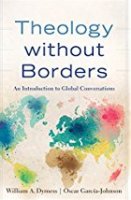As Christianity grows outside of North America and Europe, should Christian theology also change? And if so, how should theology change? These two questions constitute what William A. Dyrness and Oscar García-Johnson call “the problem of global theology” (ix). Both Dyrness and García-Johnson teach at Fuller Theological Seminary, and Theology without Borders emerged from a class that the authors co-taught on the topic. García-Johnson serves as the associate dean for The Center for the Study of Hispanic Church and Community at Fuller as well as associate professor of theology and Latino/a studies. Dyrness is dean emeritus of the School of Theology at Fuller and continues to serve as professor of theology and culture. Dyrness has been a persistent voice on the topic of global theology, having authored three books in the early 1990s, as well as serving as editor for the Global Dictionary of Theology.[1]
The authors begin by acknowledging that classical or traditional theology has been conditioned by where the church has been situated historically and geographically situatedness. The concentration of Christianity in Europe and then North America for centuries has resulted in theological formulation that is bound by Western culture. Their book seeks to open the conversation by introducing Western readers to how non-Western theologians are doing theology. Chapters 4–7 do this directly by surveying global theologians on four topics: God and Creation, Christ and the Gospel, the Church, and Eschatology. Chapters 1–3, however, lay the foundation for this survey by discussing theological method in a global context, making these chapters the most important of the book since they bear the weight for the survey that follows.
While most of the book is co-written, the first two chapters present a point of disagreement between the authors concerning the relation of Western theology to non-Western theology. In chapter 1, García-Johnson argues for a “transoccidental” approach to global theology. The goal of global theology should be “to carry out theological discourse while immersed in a post- or non-Western globalized context” (5). To present “Western theology” as universally true and applicable is to be guilty of “occidentalism” (prejudice for the West) and “theological colonialism” (6). Instead, theologians should pursue a course of “theological decolonization” (9). Such a process proceeds through “glocal (global and local) dialogue” (9). Theologians must feel free to formulate theology within their own local context (e.g., African theology, Asian theology, Latino theology, etc.), and then bring their local theology into a global conversation. The resulting global theology will possess “pluriversality and polycentricity,” which is to say that no one theology will apply universally (pluriversality) nor will various local theologies have a unified center (polycentricity) (9). Nonetheless, transoccidentalism “is not an assertion of relativism” (66). Rather it is an acknowledgement that “the full meaning of Scripture will emerge only as Christians throughout history and around the world read and respond to it together” (66).
By contrast, in chapter 2, Dyrness insists that global theology cannot escape its Western heritage. Non-Western theologians should build on Western theology while “recognizing and counteracting its weaknesses where necessary” (40). He explains that, even though Christianity is changing, it remains “burdened and blessed with a particular history” (40). Dyrness, therefore, advocates for a glocal theological conversation, just as his co-author does, but one that continues to involve the significant influence of Western theology. The result will be a “mutually corrective” dialogue (22).
In chapter 3, the authors join together to present their common understanding of global theology. Theology “develops in a particular place out of the interaction, not simply between the Scripture and culture, but between some version of the Christian tradition and the indigenous traditions of that place—both cultural and religious” (43). Thus, it is naïve to assume that a universal form of the gospel exists which can be translated into various languages and cultures. Every cross-cultural missionary brings their own enculturated Christian theology. Furthermore, translation (or contextualization) across languages and cultures always results in some sort of transformation of the message. The receptor culture will affect “how people eventually understand who God is and how they are to respond” (44). But the most important response to God’s Word is not understanding of a universal interpretation but obedience within each person’s particular cultural setting.
With these foundations in place, the authors proceed to survey how global theologians are addressing various topics in chapters 4–7. Because global theology should be a glocal dialogue, such a survey is the ideal method of doing global theology.
Dyrness and García-Johnson have written a clear presentation of their approach to global theology. Nonetheless, their approach remains deeply flawed. For the authors, the unity of Christian truth cannot be found in a unitary core of truth but rather in the whole of the multicultural conversation itself. In their approach, the concern for diversity in the theological conversation fragments theological truth itself. The authors reject relativism, but they cannot give any clear way to evaluate the truthfulness of contradictory local theologies. Their approach to global theology ends in a survey of global theologians and never goes beyond survey into the evaluation of truthfulness.
The authors adequately present the problem of global theology. Western evangelicals desperately need to hear the voices of non-Western theologians. Those who benefit from historical, political, economic, and ethnic privilege need to listen to those without privilege so that misinterpretations and blind spots might be exposed. Nonetheless, the solution offered in Theology without Borders is inadequate. While one’s own culture affects the perspective of every biblical interpreter and theologian, Christians possess only one source and standard for their theological formulation: the Bible. Christians both in the West and outside the West need to be able to evaluate their theology against the authoritative Word of God, but Dyrness and García-Johnson do not give readers the tools to do this.
[1] William A. Dyrness, Veli-Matti Kärkäinen, Juan F. Martinez, and Simon Chan, eds., Global Dictionary of Theology: A Resource for the Worldwide Church (Downers Grove, IL: IVP Academic, 2008).
